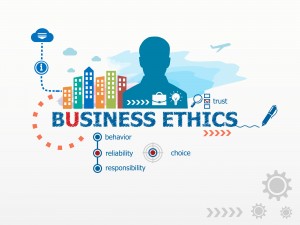Have you ever wondered if the person with whom you interact is the same behind closed doors as they appear in public? As we fast and furious in the midst of an election season, that question seems to come up more and more as we see outlandish behavior in public – making me wonder if their private life is even more raucous. Whether it’s politics or work or church the question that I  have asked (mostly in private) is shouldn’t our personal behavior be the same behind closed doors as it is in public? Stated differently, many feel that it is unethical to present a facade that doesn’t represent the truth behind one’s beliefs or actions.
have asked (mostly in private) is shouldn’t our personal behavior be the same behind closed doors as it is in public? Stated differently, many feel that it is unethical to present a facade that doesn’t represent the truth behind one’s beliefs or actions.
Care to Cultivate an Ethical Climate in the Workplace
I often heard that a fish rots from the head down. As repulsive as that statement is to some, the truth is if top management doesn’t exemplify ethical behavior, it is likely that their employees won’t either. It’s easy to say do as I say, but hard to get raving followers if what you do it quite different.
It’s not easy to maintain an ethical posture in some businesses that routinely expect their employees to leave their ethics at the doorstep once they join the organization. The question is are there two standards of behavior — one in the workplace and one in personal life?
In my opinion, ethics requires consistent behavior and ethics requires practice. Behavior that is in line with our personal values practiced over and over becomes a solid foundation for what we will do when life gets out of balance. Let me explain the concept this way – when our life is in balance – when there are no substantial challenges that we face, it is easy to do the right thing – or make the ethical choice. In fact, doing so actually is natural. However, when life gets out of balance – we lose a job, face a medical crisis, are in the midst of a divorce, or any number of life challenges – it is then that making a consistent ethical choice comes into question.
Practice makes perfect. So if we practice making ethical choices both privately and publicly, it creates a habit that underlies one’s behavior in all situations — both at home and on the job.
The biggest mistake some employees and often members of top management make is to think of ethics as relative to the situation. For example, is it acceptable to fudge the numbers in financial statements even though a person would never lie on a financial disclosure form for a loan? Is it acceptable to take small items from the office, such as office supplies, even though a person would not steal from Office Depot? Is it acceptable to request reimbursement from the company for personal expenses on a business trip even though you would judge others and lying if they made such a choice?
Workplace issues seem in so many organizations to deal with misuse of the office computer and printers – either using it for personal purposes or stealing time from the employer due to unnecessary net surfing etc. Likewise, misplaced loyalty seems to be high on the list when it comes to making ethical choices that resonate with honesty, integrity and trustworthiness.
What would you do if your superior expected you to go along with financial wrongdoing simply because he or she was your boss. Out of misplaced loyalty, some employees might acquiesce for fear of the consequences. However, once you agree to tolerate financial wrongdoing or any other unethical action out of loyalty, it’s just a small step down the proverbial “ethical slippery slope.” One misstep leads to another and after a while you become part of the problem rather than the solution. Oh and by the way, not only would that choice be unethical it would likely be illegal. Just sayin’!
Some believe that ethics is black and white. That’s not true. Ethical behavior is fundamentally making the best decision based on all the fact and circumstances available at the time. There is no question that we should all strive to make ethical choices, both personally and professionally. Why? Perhaps to be better people or make a positive contribution to society in general. Stated practically, ethics and ethical behavior is not about how we behave but how we should behave.
I know that no one is perfect and God knows I’ve made my share of dumb stupid choices (for which the consequences stunk). However, I have learned a number of things in the process such as admit your mistake right away — don’t cover it up — electing not to do it again, and of course following through by making ethical future choices.
The Business Ethics Challenge…
Business executives and business owners need to realize that there can be no compromises when it comes to ethics. Like any discipline, ethics need to be cultivated throughout the organization and it starts at the top. A substantial challenge in business today is recognizing that the facade of ethics is no longer acceptable. With almost instant access to media one cannot afford to preach their public stance and have a different set of choices – shall I say unethical choices – that are practiced behind the scenes. Today more than ever before, managers set the stage for the ethical leadership that is so important in organizations today.


